Source Audio True Spring Reverb Pedal
Turn on to the vintage charm of natural spring reverb coupled with pulsing tremolo. Source Audio doesn’t depend on the off-the-shelf reverb effects processors found in many modern reverb pedals, we handcraft every one of our proprietary effects engines and load them to high-powered, 56-bit Sigma DSP. Our two man engineering team of Bob Chidlaw…
View more pedals made by: Source Audio
View all pedals of the type : Guitar Effect Pedal New Pedal Reverb effect pedals
Description
The Source Audio True Spring Reverb Pedal is in New condition and made by Source Audio , it is just a great Pedal Reverb Spring TRUE Audio Source Guitar Effect Pedal-
Turn on to the vintage charm of natural spring reverb coupled with pulsing tremolo. Source Audio doesn’t depend on the off-the-shelf reverb effects processors found in many modern reverb pedals, we handcraft every one of our proprietary effects engines and load them to high-powered, 56-bit Sigma DSP. Our two man engineering team of Bob Chidlaw and Jesse Remignanti put years of collective man-hours into capturing every nuance and idiosyncrasy of the spring reverb and tremolo effects from some of the music gear industry’s most iconic guitar amps and outboard gear. The result is indisputable sound quality with magnificent tonal depth and precision.
The Spring Reverbs
The True Spring’s reverb effects are based on a mechanical design originated by the Hammond Organ Company™ in the late 1930s. This stark design uses a pair of input and output transducers to inject an instrument’s dry signal into an actual set of spring coils and capture the very distinct reverberations as the sound bounces back and forth within the springs. Of course, Leo Fender adopted this design in the 1960s with the some of his "blackface" amplifiers and a revolution was born.
- Short Spring Reverb: Modeled after the unmistakable twang of "blackface" amplifiers of the 1960s. After extensive research we found tremendous diversity in the spring reverb sounds of a variety of amps. Some offered a tighter, less animated tone while others sounded “drippier,” with longer sustain and livelier reverb trails. The SHORT Spring reverb engine offers a taut sound with a quick decay and smooth trails.
- Long Spring Reverb: Produces long and deep reverb decays with noticeable “drip” and highly animated trails. The LONG Spring engine is not as dramatic as the TANK Reverb engine, but does offer an extremely authentic representation of some of the livelier reverb tanks found in vintage combo amps.
- Tank Spring Reverb (Outboard Spring): Captures the unmistakable effect of the tube driven outboard spring tanks of the 60s. The sound of reverb tanks like the classic Fender 6G15™ are characterized by their “drippy” attack and animated trail. This original two-spring design produces a bouncing, delay like sound inseparable from the early days of surf rock and spaghetti western soundtracks.
The Tremolos
The True Spring Reverb also allows you to combine any of its iconic spring reverbs with any of the pedal's three tremolo effects. The True Spring's tremolos are the same organic effects that originally appeared in our Vertigo Tremolo – the winner of Guitar Player’s “Hall of Fame 2015” and Premier Guitar’s “Premier Gear Award.”
- Opto Tremolo: Optical tremolo (a.k.a. “Photocell Tremolo”) is the effect found in many combo amps of the 1960s. T . Available from Just Pedals for only £ 239 + delivery. Read More for details, demos & to order securely online.
About Source Audio
We have one of the largest online selection of new and used Source Audio music gear. If you are looking for your next pedal, we will have it online at JustPedals with fast delivery direct to you at home. Every item on the JustPedal menu is delivered by sellers to all areas of the USA & UK.
Source Audio is an American company renowned for its advanced guitar effects pedals and digital audio processing technology. Founded in 2008, the company is recognized for its innovative approach to effects design, incorporating sophisticated digital signal processing (DSP) and extensive customization features.
Source Audio’s product lineup includes a variety of pedals such as the Nemesis Delay, the Ventris Dual Reverb, and the Collider Delay+Reverb, which offer a range of high-quality, programmable effects. Their pedals are distinguished by their deep editing capabilities, allowing users to create and save custom sounds through a user-friendly interface and Source Audio’s proprietary Neuro Mobile App.
Known for their precision, versatility, and cutting-edge technology, Source Audio pedals are favoured by musicians seeking advanced tonal possibilities and seamless integration into modern setups.
Guitar Effect Pedal
A guitar pedal, also known as an effects pedal, is a device used by guitarists to alter the sound of their instrument in various ways. These pedals are typically small, foot-operated units that are connected in a signal chain between the guitar and the amplifier. They can modify the guitar’s tone, pitch, and dynamics by applying different effects such as distortion, reverb, delay, chorus, and more. Guitar pedals come in both analog and digital formats, and they allow musicians to create a wide range of sounds, enhancing their musical expression and creativity. They are essential tools for guitarists in genres ranging from rock and blues to jazz and electronic music.
New
Just New products for sale, unused, and in their original packaging. They come with a protected seller guarantee and include manufacturer warranties. Read more for additional details.
Pedal
A pedal is an electronic device that alters the sound of an electric guitar by applying various effects. Pedals are typically connected in a series between the guitar and amplifier, allowing guitarists to switch effects on and off with their feet while playing.
This enables musicians to quickly and easily change their sound, adding versatility and creativity to their performances.
Pedals are essential tools in many musical genres, including rock, blues, jazz, and metal, allowing artists to craft distinctive and dynamic soundscapes.
Once you buy one, you can’t stop and then you have to sell them and buy more.
Reverb
Reverb, short for reverberation, is a fundamental audio effect that simulates the sound reflections and decay that occur in physical spaces, such as rooms, halls, or chambers. It adds depth, dimension, and ambiance to audio signals, creating a sense of space and realism. In the context of guitar effects, a reverb pedal is a device that generates and applies reverb effects to the guitar signal. Here’s how reverb pedals work and some common features:
1. **Reverb Types**: Reverb pedals typically offer different types of reverb effects, including spring reverb, plate reverb, hall reverb, room reverb, and ambient or modulated reverb. Each type emulates the characteristics of different physical spaces and has its own unique sound and character.
2. **Controls**: Reverb pedals feature various controls for adjusting parameters such as decay time, pre-delay, damping, tone, and mix. Decay time controls the length of the reverb tail or decay, while pre-delay adjusts the time between the original signal and the onset of the reverb. Damping controls the high-frequency content of the reverb, simulating absorption in the virtual space. Tone controls the overall tonal character of the reverb, and mix adjusts the balance between the dry (original) and wet (affected) signals.
3. **Modulation**: Some reverb pedals include modulation effects such as chorus or tremolo that modulate the reverb tail, adding movement and depth to the sound. Modulation can create lush, swirling textures and enhance the overall ambiance of the reverb effect.
4. **Trail Function**: Many reverb pedals offer a trail function, which allows the reverb tail to continue decaying naturally when the effect is bypassed. This prevents abrupt cutoffs and ensures smooth transitions between affected and unaffected signal states.
5. **Spring Tank vs. Digital Reverb**: Reverb pedals can use either spring tanks or digital processing to generate reverb effects. Spring reverb pedals emulate the sound of vintage spring reverb units found in amplifiers, while digital reverb pedals use algorithms to simulate a wide range of reverb types and settings.
6. **Size and Form Factor**: Reverb pedals come in various sizes and form factors, from compact mini pedals to larger, feature-rich units. Choose a pedal size and form factor that fits your pedalboard layout and offers the desired features and controls for your needs.
Reverb pedals are widely used in various music genres, including rock, blues, jazz, ambient, and experimental music. They can add depth, warmth, and atmosphere to guitar tones, enhance the spatial imaging of recordings, and create immersive soundscapes for performances. Whether used subtly to add a touch of room ambiance or dialed in for dramatic, expansive effects, reverb pedals are essential tools for shaping guitar tones and creating captivating sounds.
£345.83
Includes Tap Switch
£504.89
Dual Reverb Effects: The Power to Combine Two Reverb Engines Truly Expands the Pedal's Ambient Possibilities. Run Dual Reverb Effects in a Parallel or Cascading Signal Path, or Split your Two Reverbs and Send a Different Effect to Each of the Pedal's Two Outputs. Massive Processing Power: Dual Processing Eliminates Bloated All-In-One Reverb Programs. Instead of being Forced to Allocate 5% of the Processing Power to something Vital and Complex like the True Spring Reverb, we can Now Dedicate 100% of the Processor, Opening the Door to a New Frontier of Realism and Sonic Exploration. True Spillover: Seamless “Spillover” from One Preset to the Next is an Enormous Advantage in Live Situations. Switch from One Reverb Preset to another without Abruptly Cutting Off the Trail of the Previous Effect. The Dual Reverb Engines make it Possible to Program (with the soon-to-be-published Neuro Desktop Editor) the Decay Rate of the First Reverb Trail.
£79.99
7 Classic Reverb Effects Room, Hall, Church, Cave, Plate, Spring, Mod. Each of them is also a storable preset slot that can used to edit and save as your own sound. Stereo High-quality stereo input and output. 7 Presets Storable preset slot for each effect. True bypass reduces signal loss. Trail On function allows effects to fade out naturally. Power Supply NOT INCLUDED Please make sure your pedal is connected to an 9V DC power supply with more than 300mA. Insufficient Current may cause problms.
£49.99 £42.99
7-Mode Effects: Room, Hall, Church, Spring, Plate, Studio and Mod. Digital circuit design, true bypass provides transparent tone. Whole Aluminium-alloy classic, stable and strong. LED indicator shows the working state. DC 9V Adapter power supply.(not included)
£256.26
24 Delay Engines – Nemesis features 12 onboard delay engines accessible via the center selector wheel, plus an additional 12 delays downloadable via the Neuro Mobile App. 128 Presets – Save up to eight presets accessible via the onboard controls or save up to 128 presets recallable with MIDI program change (PC) messages. Stereo Input and Output Jacks – Create dramatic stereo ping-pong delays, stereo phase inversion, or set up an external effects loops, pre or post delay. Tap Tempo – Tap in the delay time with the onboard tap tempo switch. Beat divisions include quarter notes, dotted eighth, and triplets. Complete MIDI Functionally – Send MIDI program change (PC), continuous controller (CC), or MIDI clock messages via the 5-pin MIDI DIN Input (also includes a MIDI Thru jack) or the USB port.
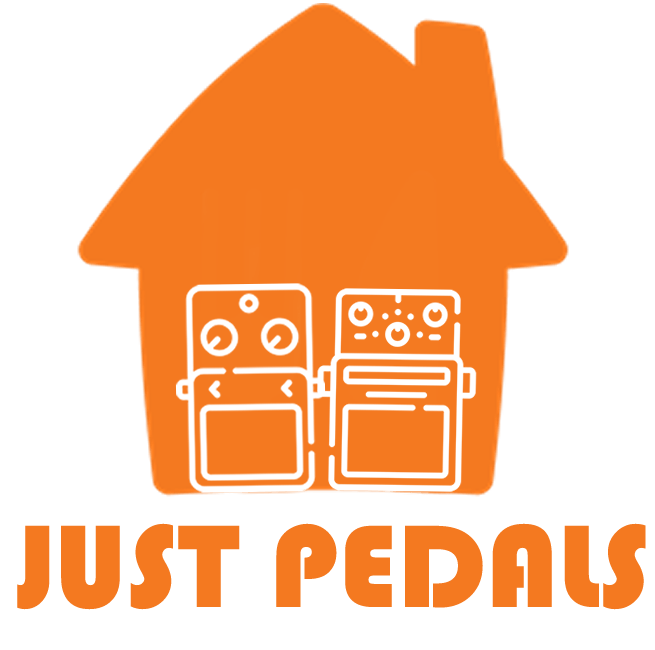

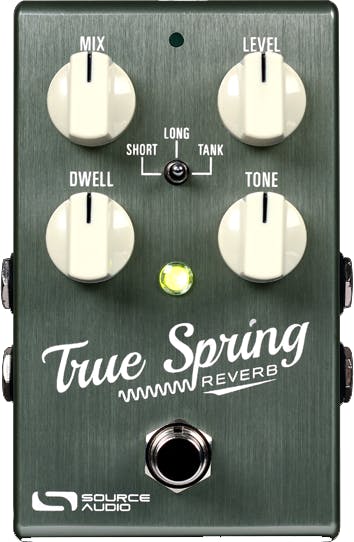
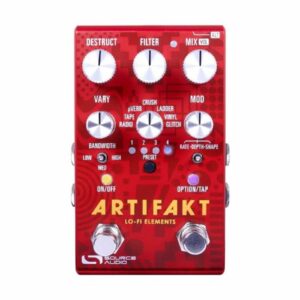

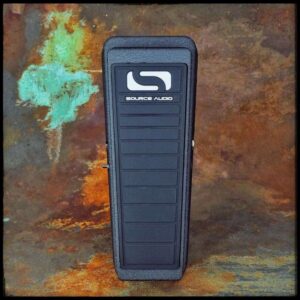
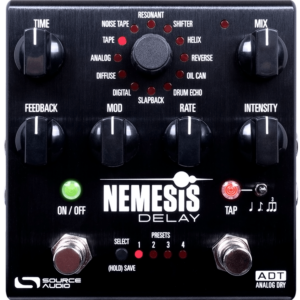
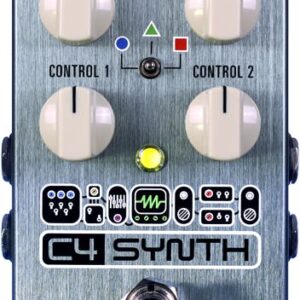
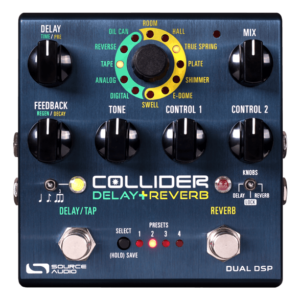
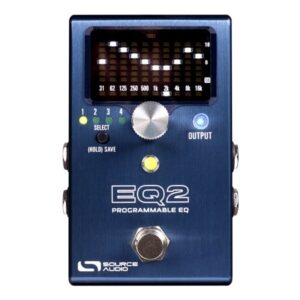
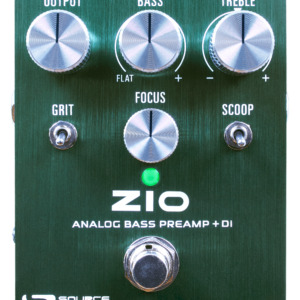
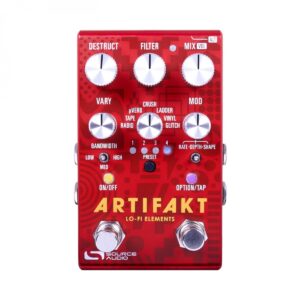
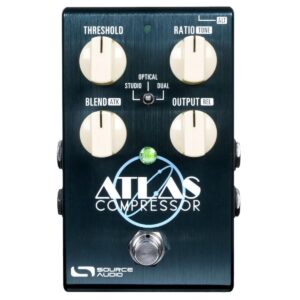





Reviews
There are no reviews yet.